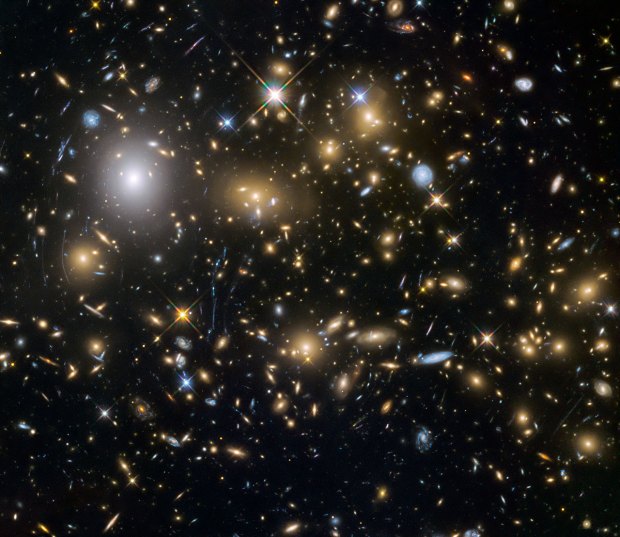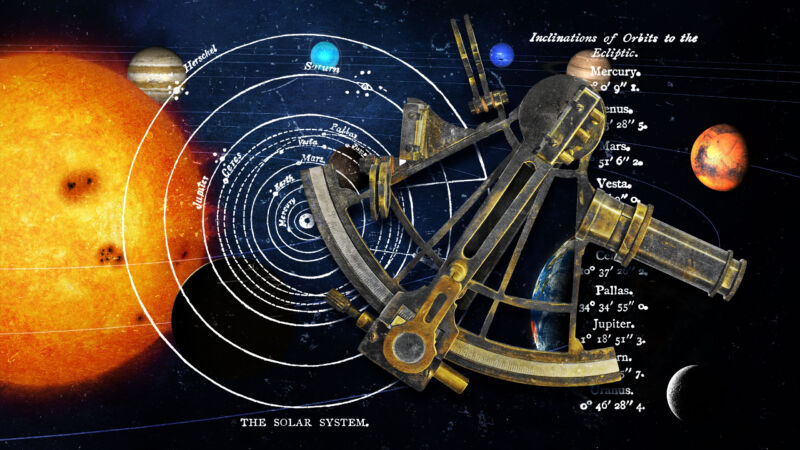- That Potential Revolutionary Scientific Reinterpretation I posted about four days ago does not seem to have played out (but that’s how science works);
- A nice summary of the top five astronomical discoveries of all time (so far);
- And a dicier list of “17 astounding mysteries that researchers can’t yet solve”;
- All these pieces are about the balance between the media and actual science; true scientific advances are very rare.
First of all, I’ve seen no positive follow-up to the news of a week or so ago about the revolutionary new interpretation of data that eliminates the notion of “dark matter” and implies that the universe is twice as old as long-thought. In searching for the researcher’s name (Rajendra Gupta), and most authoritative source I found was this. And it’s from last August!? Why did this story bubble up into my Google News feed — via many sources — last week? Don’t know. But it always pays to be skeptical, and follow-up, and check the sources.

Astronomy.com, Paul Sutter, 7 Aug 2023: Is the universe twice as old as we thought?, subtitled “A recent paper suggests our understanding of the cosmos is wrong and proposes a different model. Could this new idea be right? In a word: No.”
The gist is that this new proposal makes the current model of the universe, ΛCDM (“Lambda-CDM”) *more* complicated than it already is. There are more observations explained by the current model, than by Gupta’s.
Obviously I’m not qualified to judge the plausibility either of Gupta’s model or of Astronomy.com’s take down, on their own terms. But this just an example of our modern world. So much is going on, no one person is qualified to evaluate arguments or evidence at face value. You have to trust the experts and/or the intermediary media; those media have subject-matter experts to separate the wheat from the chaff. (It’s just that few people know to do this, and in the age of the internet, there is so much more chaff.)
Ultimately, that this news popped up in Google News is somehow an indictment of Google News, I think.
\\\
Thus, revolutionary science news is actually very rare. The standard models of the cosmos, and of evolution, are so grounded in decades of evidence and studies that the bars are very high for any truly new news about them. At the same time, there are numerous sites, like Big Think and this one, Ars Technica, that regularly remind us of the conclusions science has drawn over those decades. This is a good example.

Ars Technica, Paul Sutter, 18 Mar 2024: The top 5 astronomical discoveries of all time (so far), subtitled “From Eratosthenes’ circumference to black holes, we’ve learned a lot about the cosmos.”
OMGosh, the writer of this piece is the same as that of the Astronomy.com piece! Quite a coincidence! Here’s his bio on this site:
Paul M. Sutter is a theoretical cosmologist at the Institute for Advanced Computational Science at Stony Brook University and a guest researcher at the Center for Computational Astrophysics at the Flatiron Institute in NYC. He is an award-winning science communicator, authoring two books, Your Place in the Universe and How to Die in Space, and hosting several TV and digital series. He also writes and hosts his own Ask a Spaceman podcast. Paul is a globally-recognized leader in the intersection of art and science. His latest collaboration is a production with Syren Modern Dance that explores the nature of time, for which he serves as a U.S. Cultural Ambassador.
As I’ve said before, given the population of the planet, there are far more scientists, smart people, and wise people, alive today than have ever been alive before. (And there are also more people who don’t understand or simply deny all of their conclusions and prefer myths.)
So what are the top five astronomical discoveries of all time? Off hand, I’d say the discovery that the Earth is round, not flat; and the discovery that the stars are other suns, potentially with their own planets.
Here’s Sutter’s list, with whimsical headers, and my annotations.
- We’re gonna need a bigger boat. Yes: how Eratosthenes deduced that the world was round, in 250 BC or so. It’s a story told in every basic astronomy book.
- A call to order. Kepler and his three laws of planetary motion — about ellipses, planetary motions, and the relationship between distance from the sun and length of orbit.
- Does my universe look big in these pants?. Edwin Hubble’s discovery that galaxies exist and that they’re really far away. And the expansion of the universe.
- Of course black holes are on the list. The gradual realization, from Einstein to Schwarzschild, that such things exist, implications of physics.
- How to make an apple pie. This is about Carl Sagan’s description of how what is needed to make an apple pie was the history of the universe, in which young stars exploded and created the higher elements, everything above hydrogen and helium, like carbon, oxygen, silicon, and iron. (Thus Sagan’s quote: “We are made of star-stuff”.)
Nice conclusion:
This is the story of us. Of everything. Of the grand symphony of stars that have lived and died and recycled their elements, generation after generation over billions of years. With this insight into stellar nucleosynthesis, the circle is complete. The heavens are not some abstract realm, accessible to human perception but otherwise disconnected from us. We are made of the ashes of dead stars, and someday in the distant future, our molecules will be recycled into the creation of a new system. There are chains, light-years long and millions of years deep, that connect the stars to us and us to the stars. It’s in this work that we finally understand our place in the Universe, our part in the great cosmic drama.
And it turns out that the Universe can make a decent apple pie.
\\\
There are always mysteries. But they’re not as mysterious as some journalists like to make them out.
:format(webp)/cdn.vox-cdn.com/uploads/chorus_image/image/73212955/GettyImages_1530562630.0.jpg)
Vox, Brian Resnick, 17 Mar 2024: 17 astounding scientific mysteries that researchers can’t yet solve
What is the universe made out of? How should we define death? Where did dogs come from? And more!
Most of these have provisional answers, of course, but there are always those who question conventional wisdom, as in the dark matter story suggested. But the point here is: these are existential questions have been largely solved, if not completely. There will *always* be unsolved details; but this not mean the default explanation is… God.
The 17:
- What is the universe made of?
- How did life start on Earth?
- How did dogs evolve from wolves?
- Can animals feel grief?
- What will animals look like in the future?
- What’s the secret to a great romantic relationship?
- Where the heck does our moon come from?
- How does sound become hearing?
- Why don’t doctors know more about endometriosis?
- Is there anything alive in the human poop left on the moon?
- Was there an advanced civilization on Earth before humans?
- What is the definition of “life”?
- How should we define death?
- What did dinosaurs sound like?
- Is there such a thing as perfect encryption?
- Is it safe to use weed during pregnancy?
- How will everything end?
This is a mix of the trivial and the profound, I’ve seen as I’ve typed these out.





